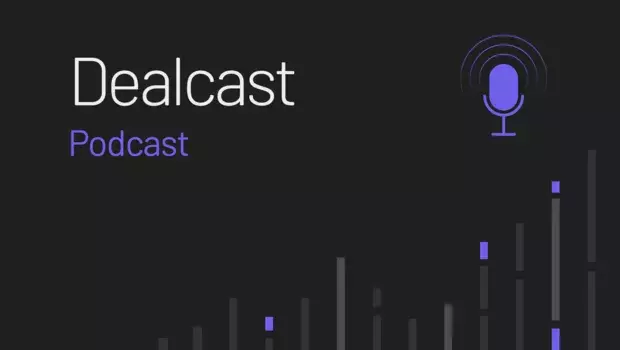Can SPACs Make a Comeback?
Special purpose acquisition companies (SPACs) have been around for decades but soared in popularity during the onset of the COVID-19 pandemic. After SPACs encountered a dramatic slowdown last year, followed by a downturn in the public market this year due to a spate of headwinds, SPACs are on the rebound in the U.S.
With newly proposed S.E.C. regulations likely to give investors more confidence, 2022 is on track to close more SPAC mergers than in 2020.
To learn more about the current SPACs landscape in America, we’re joined by Rachel Stone, a fintech reporter at Mergermarket. *Dealcast* is presented by Mergermarket and SS&C Intralinks.
In this episode, you’ll learn about:
- Deal flow data for 2022
- Where the SPAC market stands in the U.S. amid the current stock market decline
- What contributed to USD 32 billion in failed SPAC mergers
- The potential impact of the S.E.C.’s sweeping proposed set of rules for SPACs and de-SPAC deals
- Why the stock price of many de-SPACed companies has plummeted
- How de-SPAC companies could become acquisition targets
- The gradual uptick in SPACs this year
Transcript
[MUSIC PLAYING] JULIE-ANNA NEEDHAM: Welcome to Dealcast, the weekly M&A podcast presented to you by Mergermarket and SS&C Intralinks. I'm Julie-Anna Needham, a business journalist who's been covering M&A for a decade. In this episode, we're exploring the SPAC landscape in the U.S.. I'm joined by Rachel Stone who is a fintech reporter.
[MUSIC PLAYING]
Hi, Rachel. Thanks very much for joining me today.
RACHEL STONE: Thanks so much for having me.
JULIE-ANNA NEEDHAM: So can we begin by looking at where the SPAC market stands now in the US amid this broader public market decline?
RACHEL STONE: Yes. Well, SPACs aren't faring that much better. The number of newly minted SPACs in the second quarter dropped to pre-pandemic lows with just 15 of them pricing on the U.S. stock exchanges. They generated less than USD two billion in fresh capital which is actually the lowest dollar volume since 2016 according to our Dealogic data.
Now, if we compare that number to the SPAC peak in the first quarter of 2021, which saw 298 SPACs collectively raise USD 98 billion. So obviously, much, much lower in recent months. Rising interest rates, fears of a recession, and a harsh regulatory climate. Those are all contributing to this slowdown.
And it's not just new issuances either. My colleague Troy Hooper published a story in early July noting that 30 businesses had canceled their merger agreements so far this year. That includes some names like the bakery chain Panera Bread, online brokerage eToro, and software company TeleSign. In total, more than USD 32 billion has been wiped out from failed SPAC mergers so far this year. That's also according to our Dealogic data.
JULIE-ANNA NEEDHAM: So it seems that SPACs have very much fallen out of favor since that peak early last year. How much of that is to do with the regulatory climate?
RACHEL STONE: Well earlier this year, the US Securities and Exchange Commission proposed a sweeping new set of rules around SPAC listings and de-SPAC deals which just means that the SPAC has closed on a deal agreement with a target. And that would hold prospective issuers to a higher standard. So that certainly is having an impact. It's driven in part because we have seen both good and bad deals in the last two years. That's what industry participants are telling us.
The proposed rules include stringent disclosure parameters and increased liabilities that can extend to the underwriters of the transactions. So previously, underwriters for SPAC IPOs would expect to have liability at the time of the listing. But this new proposed rule would also have underwriters assume the risk for the life of the de-SPAC process and possibly beyond.
So as a result, we saw several bulge bracket banks scale back their involvement in the SPAC process. Some of those include Citi, Credit Suisse and Morgan Stanley. Honestly, more regulation was long considered a necessity amid the unprecedented rise in the popularity of the SPAC offering.
Another key item in the proposal would address the forward-looking financial projections that SPAC targets use to illustrate their growth potential. So investors have been misled by unrealistic and lofty projections, a SPAC attorney told my colleague earlier this year. And those projections can't be made in IPOs, which has been a point of contention for people saying the SPAC process is a way around the stricter regulation of a traditional IPO.
These new rules would force issuers and advisors to apply more focus to their projections and what underlies those statements. So it's, again, certainly the regulatory climate is getting a little bit stricter and hopefully, safer for the SPAC environment.
JULIE-ANNA NEEDHAM: Thanks, Rachel. And what about the companies that went public via the SPAC merger? How are they doing?
RACHEL STONE: Sure. It depends on the company, of course. But broadly speaking, they aren't doing too well. Now as you already noted, there's a broad decline in the public market. And that decline is hitting the tech sector quite strongly. So I do want to provide that context because tech is an attractive market for SPACs to search for targets.
That being said, we're seeing the share prices of some de-SPACed companies plummet. MoneyLion-- a digital bank and Dave — a financial management mobile app developer have both seen shares drop more than 90%. Swivel Holdings — a Dubai-based ride-hailing company that went public earlier this year was down more than 75 percent. Bloomberg has a de-SPAC index, which measures the performance of these de-SPACed companies. It was down 62 percent year-to-date in mid-June which was about three times the decline seen on the S&P 500.
So it's certainly not doing well, but it's something that was not necessarily unexpected either amid a broader public market decline.
JULIE-ANNA NEEDHAM: And could some of those recently de-SPACed companies become acquisition targets, do you think?
RACHEL STONE: Oh, absolutely. That's what I'm hearing from advisors and we're actually already seeing some of that in action. Paya is a payment processor that went public via SPAC in 2020. And Paya recently mandated an advisor to field takeover approaches. One lawyer I spoke with said it's cosmetically challenging to take private a company that just went public. But that his firm is speaking with private equity firms that are very interested in those potential opportunities.
A couple of deals have already been announced. SOC Telemed-- a telemedicine provider, went public in November 2020 via SPAC merger. It traded on its first day at USD 9 a share. And in April, it was taken private by Patient Square Capital for just USD three a share. There's also auto insurer Metromile which has agreed to be acquired by the publicly-traded insurance company Lemonade.
Sources also tell me that it isn't just de-SPACed companies that might be targets. Companies that hit the market recently via traditional initial public offering could also be attractive acquisition targets. I've heard of likely targets in this rising cost of capital environment being companies with top-of-class innovative tech that aren't commercial yet and don't have enough funding to get to commercialization.
Another source said all companies with less than USD two billion in market cap are natural targets. Obviously, time will tell but I think we're going to hear more about both de-SPACed and recently IPOed companies being involved in transactions in the latter half of the year and into 2023.
JULIE-ANNA NEEDHAM: Great. Thank you. And with all of that in mind, will SPACs continue to come to market and will you see SPAC mergers still happening in the future?
RACHEL STONE: For sure. They'll still continue to happen though, perhaps, not at the same pace that we saw in the heated market last year. What we have to remember here is that SPACs dramatically accelerated in use in 2021. Hundreds of companies were out there looking for targets.
Likely, many of them took companies public that wasn't ready to be public. And we're seeing some of that blowback play out in the market. But the SPAC process will still exist in the future. There are many strong sponsors that had executed these deals well before the craze of the last two years. It's not a new thing. These SPAC issuances have been around for decades but obviously, really soared in popularity during the onset of the COVID-19 pandemic.
JULIE-ANNA NEEDHAM: And is something we saw a lot of on the London market with foreign oil and gas and mining companies listing around about 10 years ago via the SPAC route. But then they seem to have fallen largely out of favor in Europe in more recent years, although, perhaps, having some kind of resurgence following on the back of the US trend.
RACHEL STONE: Yes. And I am hearing that the oil and gas market might still be an attractive market for SPACs to look at in the coming months here. So certainly, it's still going to be a factor and still going to be another route to the public market. And that regulation is coming, which should give investors more confidence in that pathway to the public market.
Honestly, if we look at the deal flow data, we're on pace to close more SPAC mergers this year than in 2020, which might sound surprising given all of the things that we've just talked about. And certainly, we won't get close to last year's number which was at 199 deals. But we've already completed 50 in 2022 compared with a total of 64 in 2020. So we are still seeing substantial dealmaking activity and I don't expect SPACs to go away at all even if they slow down a little bit from the highs of 2021.
JULIE-ANNA NEEDHAM: Thank you. And finally, if people want to keep on top of the SPAC market, how can they find out more?
RACHEL STONE: Mergermarket publishes a weekly feature called Spotlight on SPACs. And that would be a great resource for anyone wanting to keep up with the SPAC market. My colleague Troy Hooper leads that endeavor and he just does a great job delving into all of these different topics. There's so much that we didn't get a chance to cover on the podcast today but he delves into types of sponsors, pipes and redemptions, and cross-border activity.
So there's just so much more in this SPAC world to keep up on and you can bet he'll be following all of the regulatory efforts as well as those come into fruition later this year.
JULIE-ANNA NEEDHAM: Great, Rachel. Thanks very much.
RACHEL STONE: Thank you so much for having me.
[MUSIC PLAYING]
JULIE-ANNA NEEDHAM: That was Rachel Stone who is a fintech reporter. Thanks for listening to this week's episode of Dealcast presented by Mergermarket and SS&C Intralinks. Please rate, review, and follow the podcast. You can find us on Apple Podcasts, Spotify, or look out for your Mergermarket news alert. For more information, have a look at our show notes. Join us next week for another episode.
[MUSIC PLAYING]



